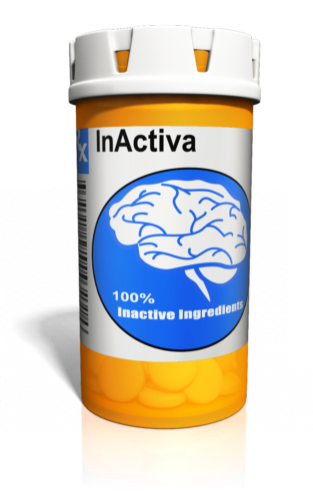 A recent study indicates roughly half of American physicians prescribe placebos for some of their patients.
A recent study indicates roughly half of American physicians prescribe placebos for some of their patients.
A placebo, of course, is a “pretend” medication that is prescribed without the patient’s knowledge.
Often it’s used as a “control” in a medical study, to compare the effects of an experimental drug with those of something that, by itself, should have no effect.
“The Placebo Effect” refers to the phenomenon of people reporting symptom relief simply because they believe they’re receiving genuine treatment for their ailments.
The superficial response to this phenomenon is to think, “Boy, people sure are gullible.”
But there’s considerable evidence to suggest that, at least in some cases, placebos can genuinely reduce physical symptoms.
As Dan Ariely points out in his book, PREDICTABLY IRRATIONAL, the expectation of a physiological response can trigger that response:
“In the case of pain, expectation can unleash hormones and neurotransmitters, such as endorphins and opiates, that not only block agony but produce exuberant highs (endorphins trigger the same receptors as morphine).”
Ariely speaks from experience. He was hospitalized for three years with third degree burns over 70% of his body:
“I vividly recall lying in the burn ward in terrible pain. As soon as I saw the nurse approaching, with a needle almost dripping with painkiller, what relief! My brain began secreting pain-dulling opiods, even before the needle broke my skin.”
But Dan, What Does This Have to Do with Radio Advertising?
We’re almost there; stay with me….
“Placebo” derives from a Latin term that means “I shall please.”
Sometimes, the patient actually experiences improvement from the pleasant expectation of relief.
Unfortunately, too many radio advertising salespeople routinely sell placebos to their clients: worthless commercials that “please” the advertiser, that make the advertiser feel good (temporarily)…but which do not produce the result the client needs.
In a medical situation, a “pretend” medication that actually reduces some patients’ pain has value, and those patients are pleased.
But no amount of “pleasing” advertisers by saying their names 12 times, reciting their phone numbers, street addresses, business hours and every sale item by name and price will produce the results they really need.
Those account execs will land some orders by selling placebo spots. But they’ll be committing advertising malpractice, and the patient — the client — will pay the price.
Meanwhile, most stations happily will continue to sell clients whatever they want. To please them.
The Way It Usually Is
Advertising Client: “I don’t like that commercial.”
Radio Station: “We’ll change it! Just tell us what to do.”
The Way It Should Be
Advertising Client: “I don’t like that commercial.”
Radio Station: “So?”
Now I Have Enraged a Few Thousand Sales Managers.
“I don’t know what planet he lives on, but in our world if the client doesn’t like the spot, we replace it with a different one.”
Imagine, If You Will…
Patient: “I don’t like the taste of that medicine.”
Doctor: “You don’t like the taste? Well, then, just tell me what taste you do like and I’ll prescribe you a drug that will please your palate.”
No, here’s how any responsible (professional) doctor would respond:
“So?”
As a radio advertising professional, your job is not to make the client happy. It’s to make them money.

